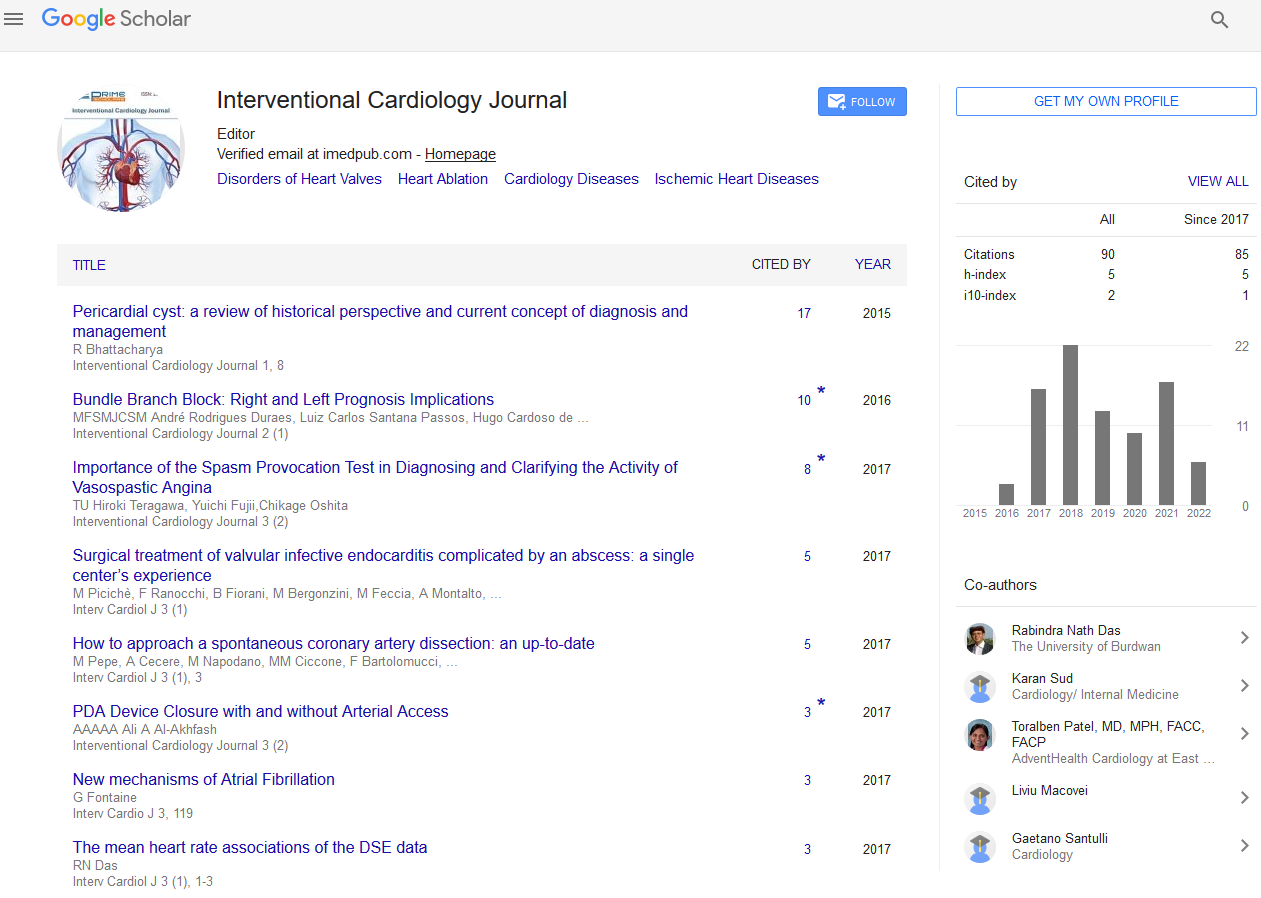Opinion - (2024) Volume 10, Issue 7
Advancements in Arrhythmia Management: Enhancing Cardiac Health Through Precision Care
Austen Jane*
Department of Cardiology, Harvard University, United States
*Correspondence:
Austen Jane,
Department of Cardiology, Harvard University,
United States,
Email:
Received: 01-Jul-2024, Manuscript No. ipic-24-21010;
Editor assigned: 03-Jul-2024, Pre QC No. ipic-24-21010 (PQ);
Reviewed: 17-Jul-2024, QC No. ipic-24-21010;
Revised: 22-Jul-2024, Manuscript No. ipic-24-21010 (R);
Published:
29-Jul-2024, DOI: 10.21767/2471-8157.10.07.66
Introduction
Arrhythmias, or abnormal heart rhythms, pose significant
challenges in cardiovascular medicine, necessitating
comprehensive management strategies to prevent adverse
outcomes and improve patient quality of life. This article
explores the evolution of arrhythmia management,
highlighting advancements in diagnosis, treatment, and patient
care. Arrhythmias encompass a broad spectrum of cardiac
rhythm disturbances, ranging from benign ectopic beats
to life-threatening ventricular tachyarrhythmia’s. Effective
management of arrhythmias requires a multidisciplinary
approach, integrating clinical assessment, diagnostic testing,
and therapeutic interventions tailored to individual patient
needs. One key aspect of arrhythmia management is accurate
diagnosis, which relies on a combination of clinical history,
physical examination, and diagnostic testing modalities such
as electrocardiography ambulatory monitoring, and cardiac
imaging.
Description
Advances in technology, including high-resolution mapping
and signal processing algorithms, enable more precise
characterization of arrhythmia mechanisms and localization of
arrhythmogenic foci. Moreover, non-invasive imaging techniques
such as echocardiography, cardiac magnetic resonance imaging
and computed tomography play a crucial role in assessing
structural heart disease and identifying underlying substrates
for arrhythmias. These imaging modalities provide valuable
insights into cardiac anatomy, function, and scar burden,
guiding treatment decisions and risk stratification in patients
with arrhythmia disorders. Invasive electrophysiological studies
remain a cornerstone of arrhythmia diagnosis and treatment,
allowing for precise mapping of arrhythmogenic circuits
and assessment of conduction properties within the heart.
Catheter ablation, a minimally invasive procedure performed
during offers curative therapy for many arrhythmia syndromes,
including atrial fibrillation, supraventricular tachycardia, and
ventricular arrhythmias. Advancements in catheter ablation
techniques, including contact force sensing, three-dimensional
mapping, and cry ablation technology, have improved
procedural efficacy and safety, resulting in higher success rates
and lower complication rates. Additionally, hybrid approaches
combining catheter ablation with surgical interventions offer
novel treatment options for patients with complex arrhythmia
substrates or failed previous ablation procedures. For patients
at risk of sudden cardiac death due to ventricular arrhythmias,
implantable cardioverter-defibrillators serve as life-saving
devices, delivering timely defibrillation therapy to terminate
malignant arrhythmias and prevent cardiac arrest.
Conclusion
By leveraging cutting-edge diagnostic technologies, innovative
therapeutic interventions, and multidisciplinary collaboration,
clinicians can effectively diagnose, treat, and manage
arrhythmias, ultimately improving patient outcomes and
enhancing cardiac health. Patient education and shared decisionmaking
play pivotal roles in optimizing arrhythmia management
and promoting patient-centered care. Empowering patients
with knowledge about their condition, treatment options,
and lifestyle modifications fosters a collaborative partnership
between patients and healthcare providers, enhancing
treatment adherence and long-term outcomes. In conclusion,
advancements in arrhythmia management have revolutionized
the field of cardiovascular medicine, offering new hope and
possibilities for patients with cardiac rhythm disorders. By
embracing innovation, collaboration, and patient-centred care,
healthcare professionals can continue to push the boundaries
of arrhythmia management, ensuring that every patient
receives personalized and effective treatment tailored to their
unique needs and circumstances.
Citation: Jane A (2024) Advancements in Arrhythmia Management: Enhancing Cardiac Health through Precision Care. Interv
Cardiol J. 10:66.
Copyright: © 2024 Jane A. This is an open-access article distributed under the terms of the Creative Commons Attribution Li
cense, which permits unrestricted use, distribution, and reproduction in any medium, provided the original author and source
are credited

